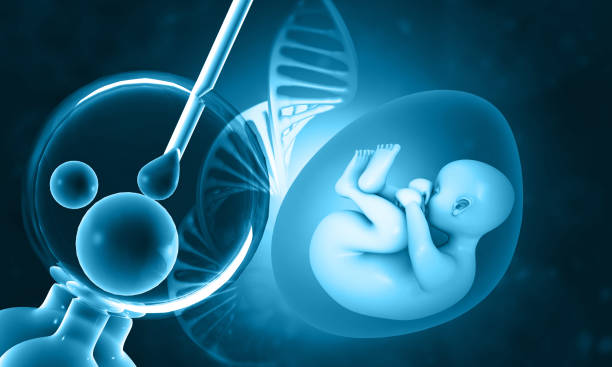About 20% of pregnant people feel anxious or depressed during pregnancy. This shows how important it is for you to be mentally healthy for your baby. The womb is your baby’s first home, and what you feel can affect the baby’s growth. Mother’s mental health should not be taken lightly at all.
When you feel stressed or have depression and anxiety, it can harm your baby. Which can lead to problems like mental health issues, trouble thinking and behaving, and trouble controlling emotions. It’s important to know how your mental health affects your baby’s life from the start.
What is Maternal-Fetal Connection
The bond between you and your growing fetus is very close. The womb is the fetus’s first home, and your life and mental health affect the baby’s growth. Studies show that stress, depression, and anxiety in mothers can deeply affect the unborn child.
The Womb as the First Environment
The fetus picks up on your signals, getting ready for life outside the womb. But, if you are stressed or depressed, it can harm the child’s future. Babies of stressed or anxious mothers react more and connect differently in the brain, likely because of changes in the mother’s HPA axis and high cortisol levels.
Depression’s Biological Impact on the Fetus
Depression and anxiety in mothers affect the fetus. Research shows that stress in mothers can lead to mental health issues in kids, like anxiety, depression, ADHD which is attention deficit hyperactivity disorder, and autism. Stress also changes the placenta’s genes, letting more cortisol reach the fetus and affect brain development.
How Does a Mother’s Mental Health Affect the Baby?
As a mother, your mental health during pregnancy can affect your child’s growth. Prenatal stress, like depression and anxiety, can lead to problems for the child. These issues include higher chances of anxiety, depression, ADHD, and autism. Stress can also hurt the child’s thinking skills, feelings, and behavior.
Prenatal Stress and Child Development
These changes in the fetus might help if the baby faces stress after birth. But they can cause problems if the baby has an easy life. It’s important to help mothers with mental health during pregnancy for the good of both the mother and child.
Maternal distress can affect kids into their teens, showing how important pregnancy is for a child’s future. In Australia, 1 in 5 moms face depression and anxiety during pregnancy. This can harm a child’s growth and health later on.
Postpartum depression hits many new moms, making it hard to care for their babies. It can also make mental health issues worse.
When moms struggle with mental health, their kids might face developmental and behavioral issues. Babies of depressed moms may be born too small and have health problems for instance they might cry a lot. As they get older, they could have trouble thinking, feeling, and behaving. It’s key to help moms with their mental health to support the well-being of both mom and baby.
Ways Mental Health of a Mother Affects the Baby
There are several ways that your mental health affects your baby and child. One keyway is through the HPA axis (Hypothalamic-pituitary-adrenal) and the stress hormone cortisol. When a mother is stressed or depressed, it can interfere with the HPA axis. This leads to high cortisol levels that can get through to the baby.
The Role of the HPA Axis and Cortisol
Maternal stress can also change how the placenta works. This lets more cortisol get to the baby. This change in cortisol levels can affect the baby’s brain development and connections. It might make the child more likely to have mental health issues later on.
Epigenetic Changes and Placental Function
Maternal mental health can also change genes in the placenta through epigenetics. When a mother is very stressed, a gene that controls an enzyme that breaks down cortisol can get turned off. This means more cortisol gets to the baby, which can harm the developing brain. These changes can stick with the child and even pass down to future generations, increasing mental health risks.
Risks and Outcomes
When you as a mother are stressed, it can harm your children’s mental health. This includes issues like depression, anxiety, and stress. Children of moms with these problems are more likely to face mental health issues themselves.
These issues can include anxiety, depression, ADHD, and autism spectrum disorder. These effects can last into the teen years and even adulthood. This shows how important the womb is for a child’s mental health later on.
Cognitive, Emotional, and Behavioral Effects
Maternal mental health in pregnancy also affects a child’s thinking, feelings, and actions. Kids of moms with prenatal depression or anxiety might not do as well in school. They might struggle with managing their feelings and could act out more. These problems can start early and keep going as the child grows.
Maternal History and Trauma
Studies show that a mom’s past trauma can affect her child even before they are born. When you have a tough childhood, it changes the way your baby’s brain works. This means your past can change your biology, which then affects your baby’s brain development.
This shows how trauma and tough times early in life can shape a child’s future. For example, research by Delker et al. (2014) linked a mom’s abuse history to her child’s struggles with controlling their feelings.
The World Mental Health Survey in 2016 showed that many people worldwide have faced traumatic events. This makes it clear we need to look at how trauma affects moms and their kids. All this shows how important it is to help moms who have been through trauma. This can help protect their kids from the effects of trauma.
Conclusion
As a mother, your mental health during pregnancy deeply affects your child’s development. Conditions like depression and anxiety change the womb environment. This can lead to mental health issues and other problems in the child.
Healthcare providers are key in helping mothers and their children. They can prevent and treat mental health issues during pregnancy. This helps improve your child’s future and prevents problems.
Research shows a strong link between a mother’s mental health and her child’s development. Focusing on the emotional well-being of pregnant women is crucial. It helps ensure healthier pregnancies and better outcomes for children, leading to a brighter future for families and communities.


